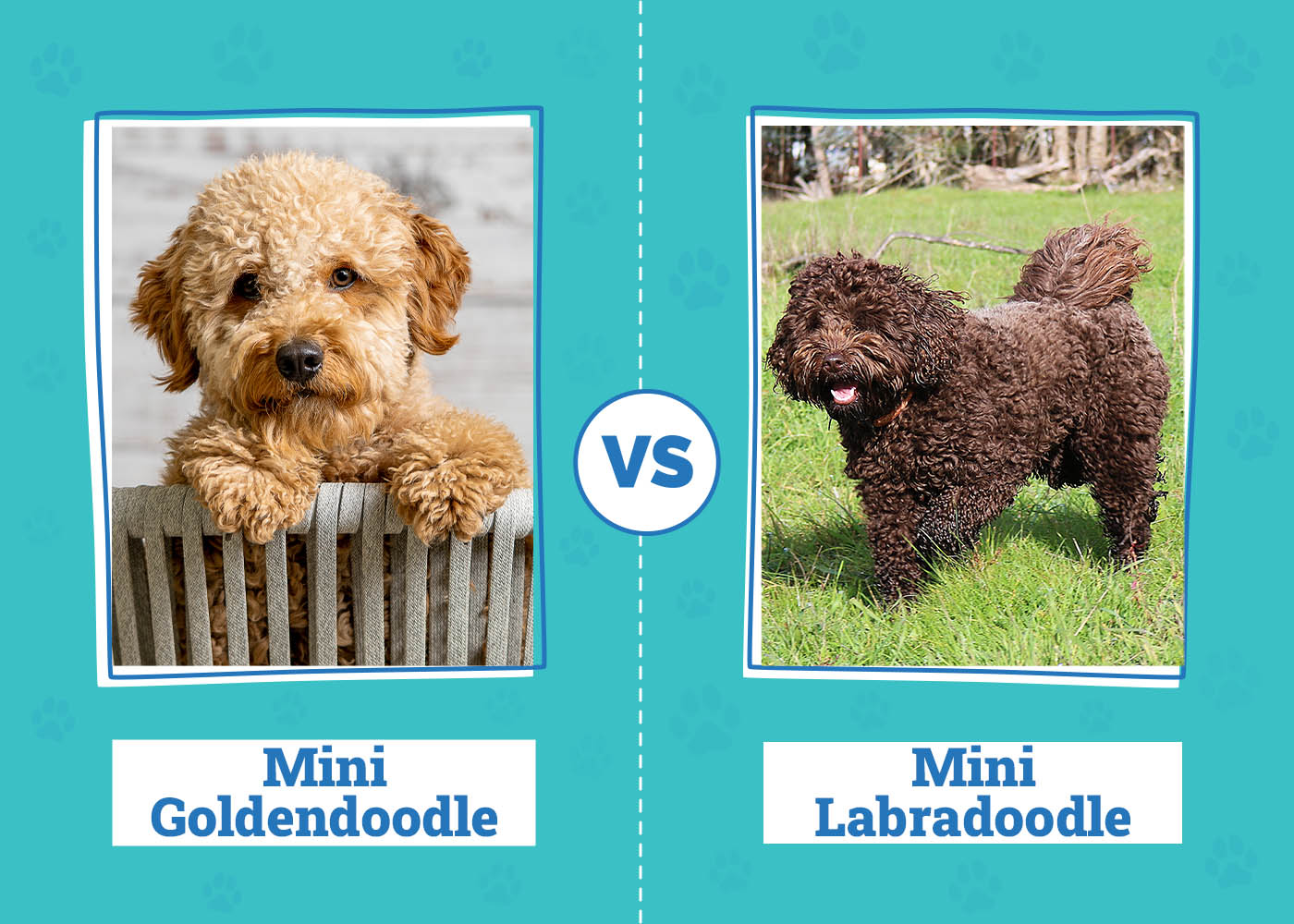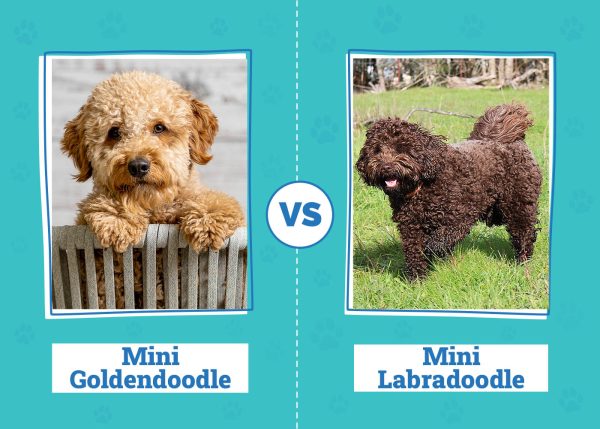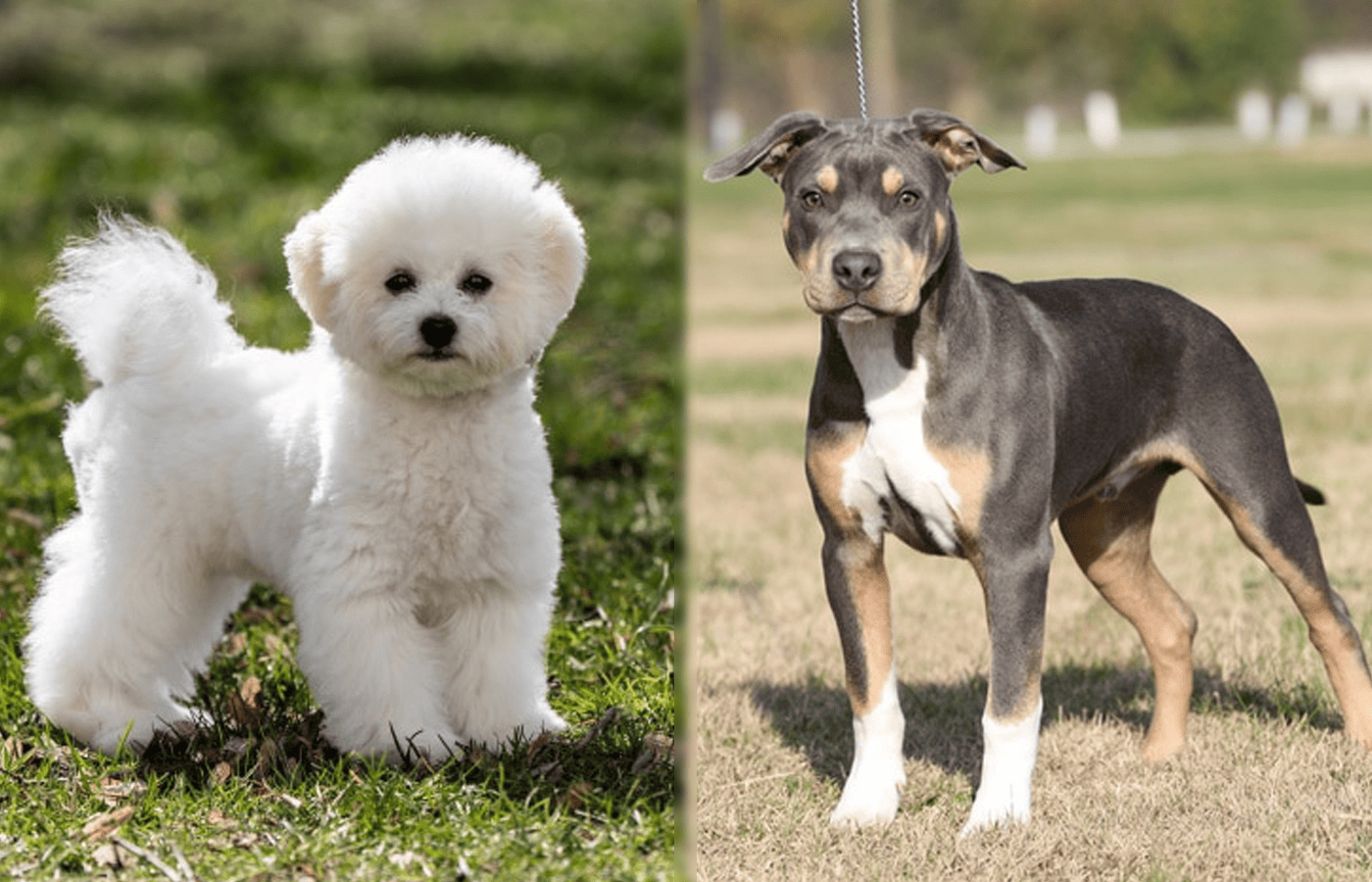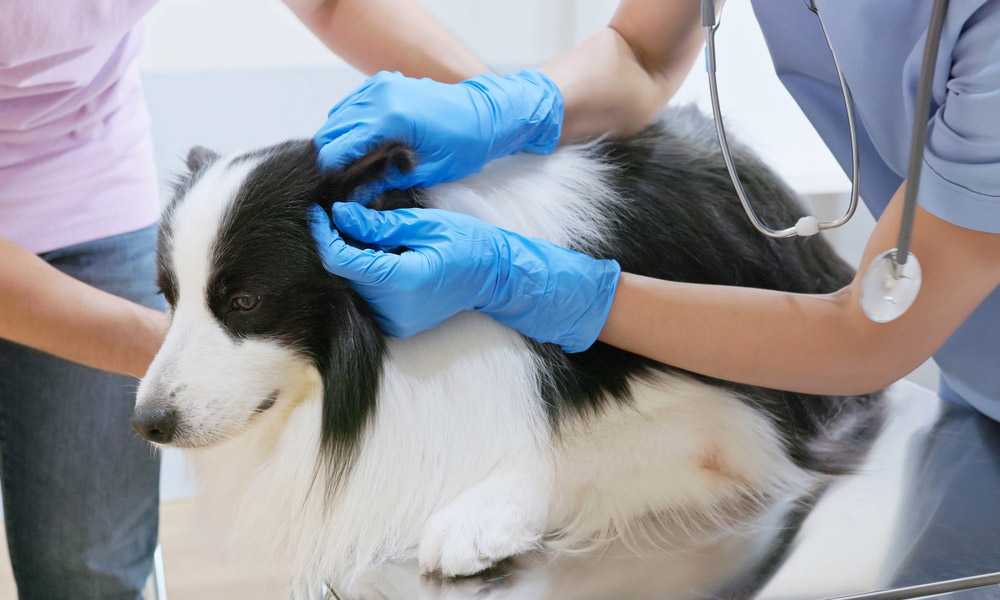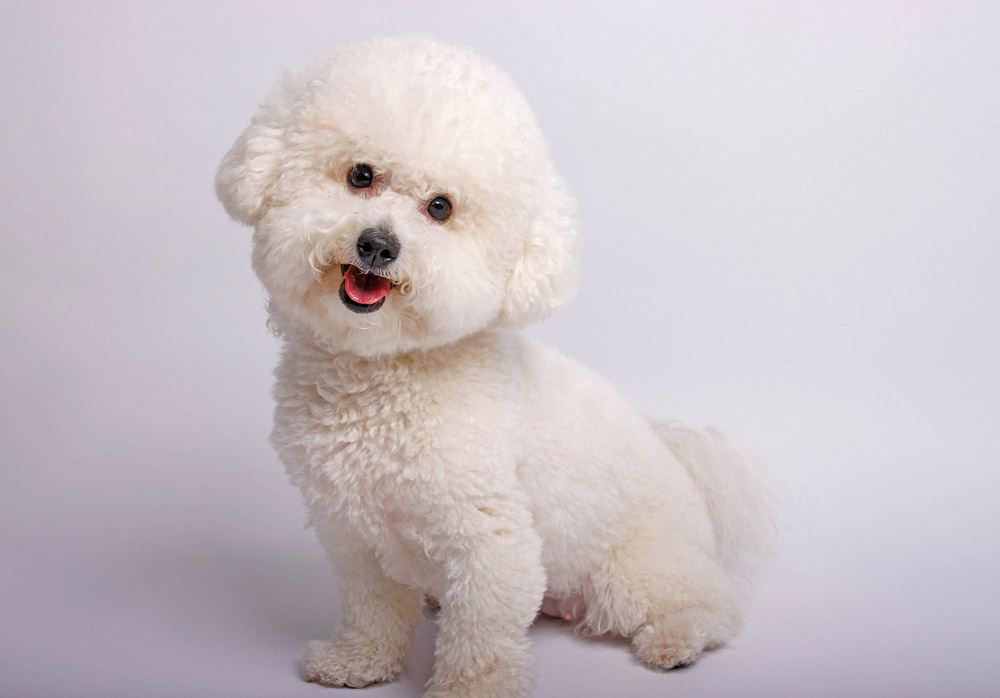Click to Skip Ahead
Doodles are trendy these days, and it’s no wonder the Labrador and Golden Retrievers were put in the mix. They are two of the most popular breeds, but many can’t adopt them due to allergies. Adding in the Poodle puts a splendid spin on these otherwise unfavorable aspects, making them more manageable and adorably curly.
Labs and Goldens are one standard size, but Poodles can be one of three sizes: toy, miniature, and standard. So, the hybrid’s size will vary depending on the type of Poodle. Miniature Goldendoodles and Labradoodles are smaller, compact dogs with exuberant personalities. We’ll discuss their similarities and differences below so you can determine which one will make a better pet.
Visual Differences
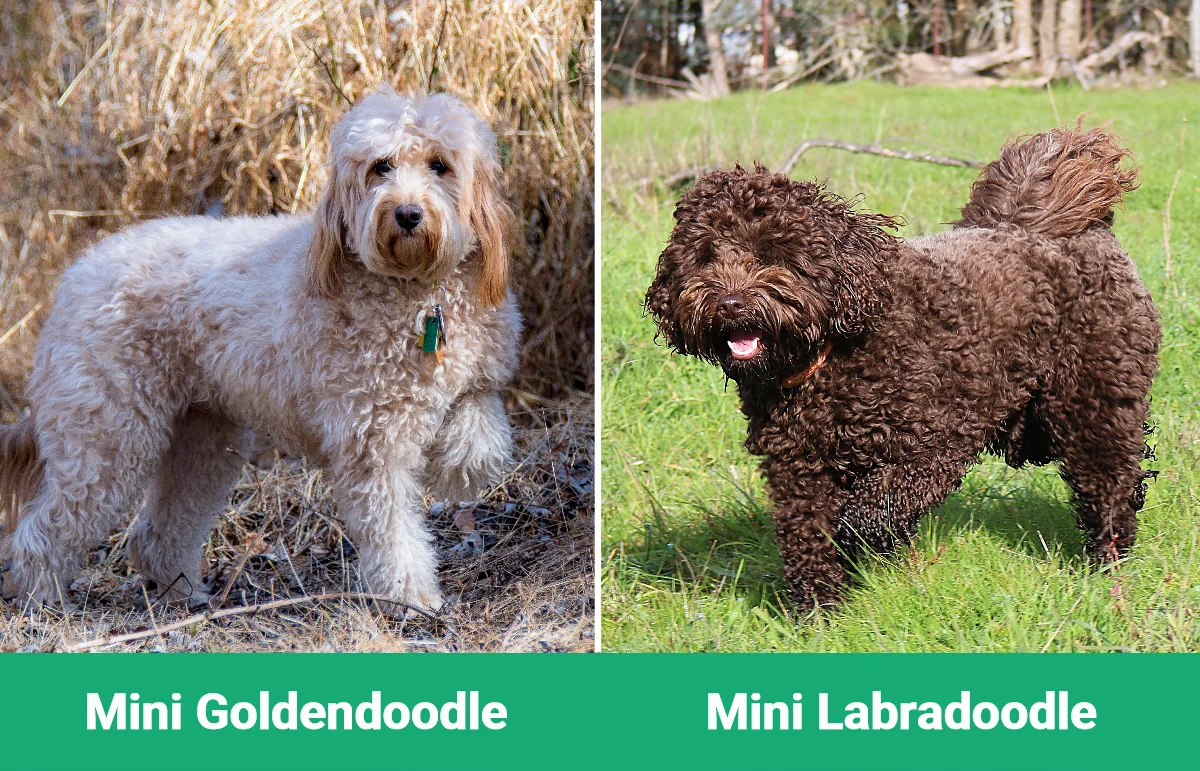
At a Glance
- Average height (adult): 16–17 inches
- Average weight (adult): 25–35 pounds
- Lifespan: 12–16 years
- Exercise: 1+ hours a day
- Grooming needs: Moderate
- Family-friendly: Yes
- Other pet-friendly: Often
- Trainability: Friendly, playful, affectionate
- Average height (adult): 15–16 inches
- Average weight (adult): 15–25 pounds
- Lifespan: 12–14 years
- Exercise: 1+ hours a day
- Grooming needs: Moderate
- Family-friendly: Yes
- Other pet-friendly: Often
- Trainability: Active, friendly, attached

Mini Goldendoodle Overview
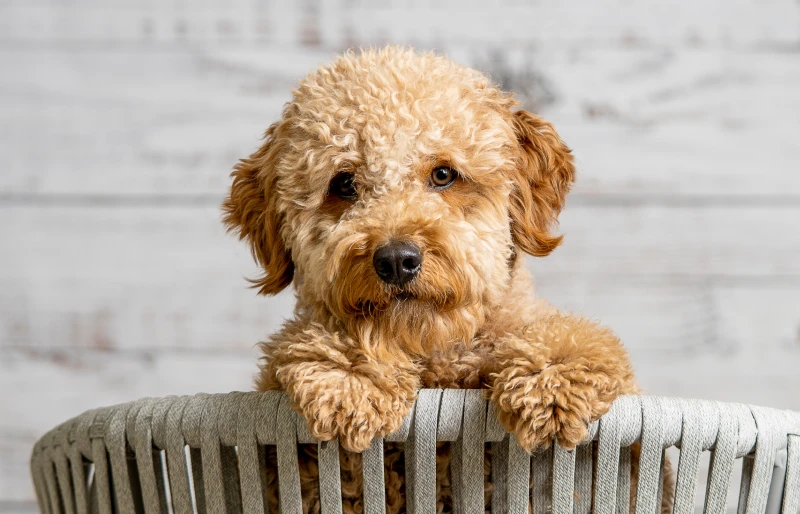
Mini Goldendoodles have been around since the mid-1990s and have grown in popularity ever since. They are a household name, living in the city, suburbs, and country homes across the globe. People genuinely enjoy the hypoallergenic qualities and amiable nature of mini Goldens and Labs.
Personality / Character
The miniature Goldendoodle takes on traits of the Golden and Poodle parents. They are family dogs and enjoy having furry and human friends around them. They are incredibly friendly and gentle with children and make excellent playmates for young kids. Because of their friendly and aware demeanor, they make excellent first-time dogs for novice owners.
These silly dogs are vibrant, affectionate, and amiable. They will engage excitingly with their human companions and enjoy accompanying you virtually anywhere you take them. Typically, Goldendoodles don’t bark excessively but will warn you of suspicious activity around the home.
They don’t like to be left alone for long periods and are more suitable for owners who stay close to home. Also, long periods of alone time can cause separation anxiety and other behavioral issues.
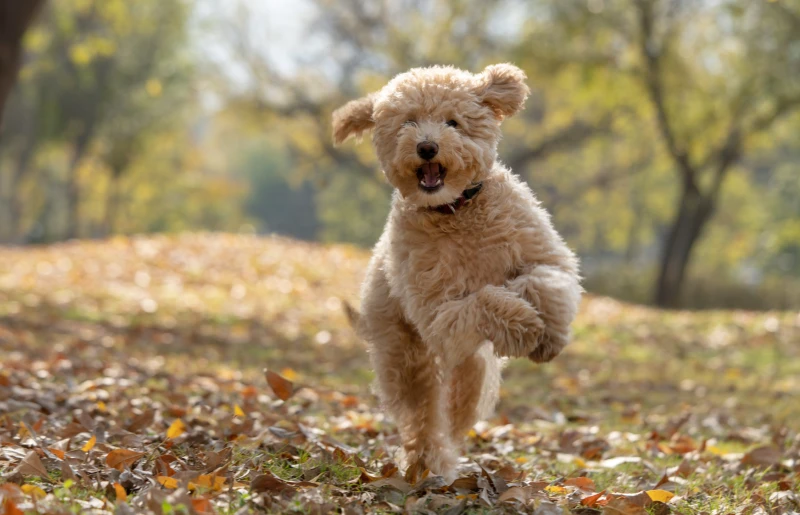
Exercise
Miniature Goldendoodles love being on the go. They will tucker themselves out in a day just by following you from room to room. These shadow dogs are curious and need to know what’s happening around the house.
In addition to normal day-to-day activities, they need a minimum of an hour of exercise per day. Exercise will expel their pent-up energy and prevent your Goldendoodle from getting bored or anxious.
Training
Goldendoodles are highly trainable but very spirited, so they may test your patience and push the bounds of dominance. However, they can adjust quickly to direction and are eager to please owners.

Health & Care
Goldendoodles, miniature included, can inherit several health issues from their parents. However, with reputable breeding, these issues generally don’t crop up genetically. You should always ensure your miniature Goldendoodle is up to date on their vaccinations and receives proper annual vetting every year.
- Sebaceous adenitis
- Subvalvular aortic stenosis
- Addison’s disease
- Progressive retinal atrophy
- Von Willebrand’s disease
- Cataracts
- Glaucoma
Breeding
Breeders produce the Goldendoodle by crossing a Golden Retriever and a Miniature Poodle. Because of the size difference, reputable breeders use artificial insemination. This practice is primarily implemented if the other parent is a toy Poodle. The problem with breeding them is that you can’t predict if they’ll favor the toy Poodle or Golden Retriever. Some might be nearly as big as the Golden Retriever, and others can be the toy size. Even puppies in the same litter can be of different sizes.
However, sometimes breeders do not use the 50/50 method. Instead, using multi-generation crosses, they hybridize the dogs to have more Poodle or Golden Retriever genes.
- F1 Mini Goldendoodle—50% Golden Retriever/50% Mini or Toy Poodle
- F1B Mini Goldendoodle—25% Golden Retriever/75% Mini or Toy Poodle
- F2 Mini Goldendoodle—F1 Goldendoodle Cross/F1 Goldendoodle Cross
- F3 Mini Goldendoodle—F2 Goldendoodle Cross/F2 Goldendoodle Cross
- Multi-generational Goldendoodle—F3+
Suitable For:
Mini Goldendoodles are excellent family companions for growing families, single owners, and just about anyone in between. They can get along with other pets, especially with early socialization. They can adapt to any lifestyle as long as you can provide a healthy diet, exercise, training, and plenty of love.
Mini Labradoodle Overview
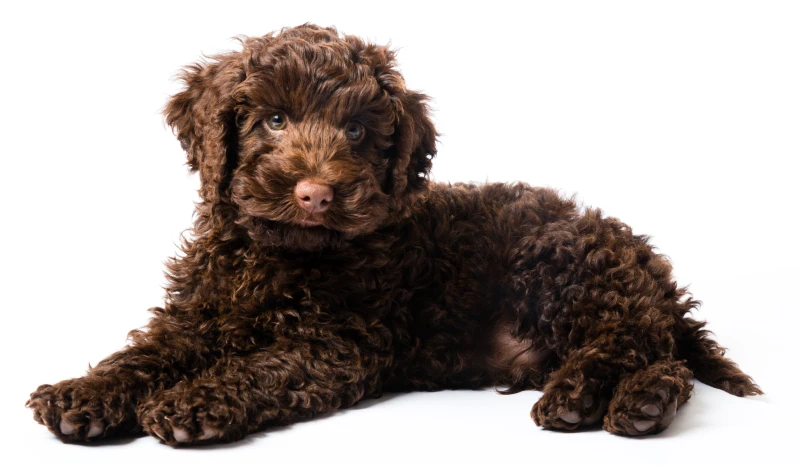
The Mini Labradoodle predates the Mini Goldendoodle by several years. They were around in the 1960s but weren’t refined into the breed they are today until 1989. Because of their desirable qualities, they’ve become incredibly popular. If they inherit the poodle’s coat, they rarely shed, but Labradoodles with Labrador coats shed frequently.
Personality / Character
The Labradoodle is beloved for their playful and affectionate demeanor. They make excellent companions for growing families and energetic single owners. The miniature Labradoodle is a swift little dog that likes to run and play. They’ll happily accompany their families anywhere and are the ideal size for traveling. Even though they love everyone in the household, mini Labradoodles form stronger bonds with one person.
Some relax as they start to age, but others keep their vitality long into adulthood. Since mini Labradoodles are so people-oriented, they can’t handle long periods in a kennel or restricted space. They are highly social and need to be with people and other dogs. If their social needs go unmet, it can lead to behavioral problems that can be hard to correct.
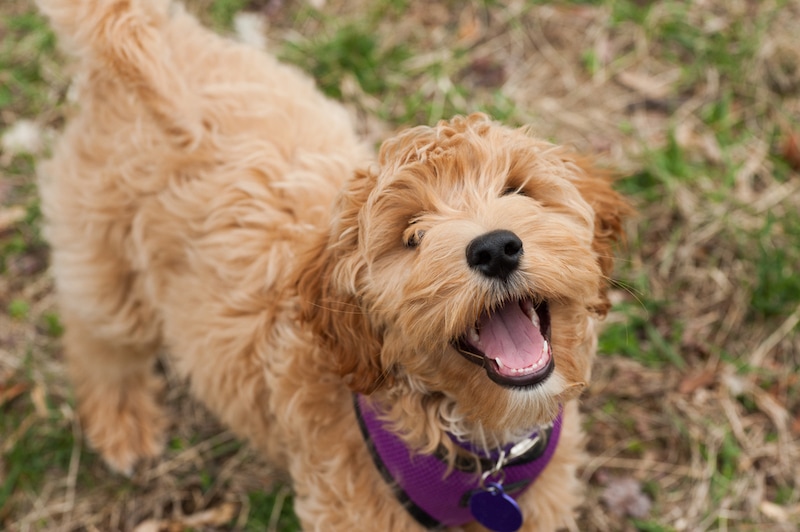
Exercise
The Lab is an athletic dog, and it’s likely that your mini Labradoodle will have plenty of energy. They benefit from vigorous exercise and need to run around in a fenced-in yard. If you let your Labradoodle get bored, they can become anxious, stressed, and destructive. Like the Goldendoodle, they can suffer from separation anxiety.
They need an hour or more of daily exercise and can accompany you on jogs and long walks.
Training
Training your miniature Labradoodle is a crucial part of your ownership duties. However, it’s much easier than training them than other miniature pups. They can learn challenging tricks and learn to be therapy dogs. Potty training should take no time at all, and it’s best to start obedience training early.
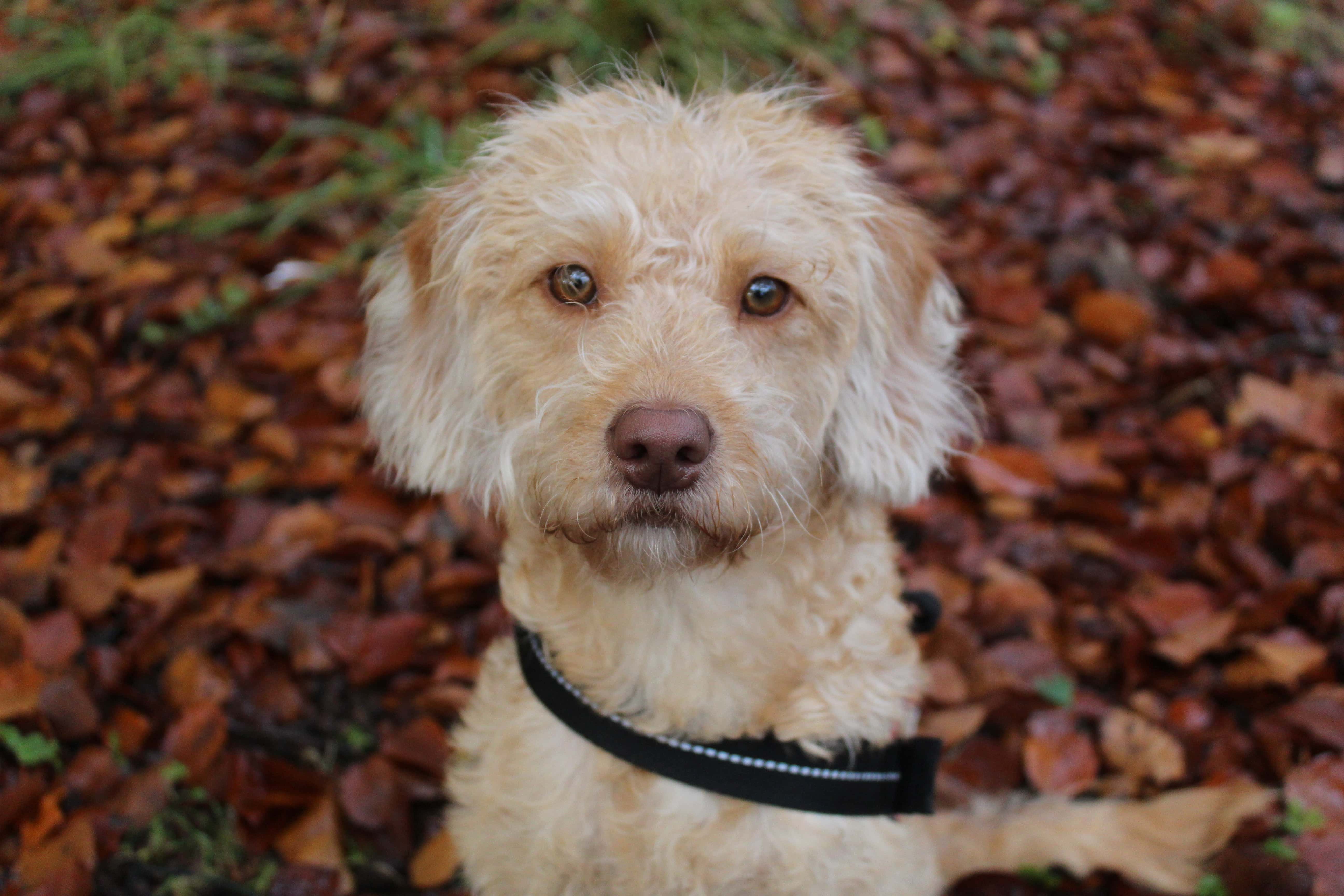
Health & Care
Labradoodles are pretty healthy dogs. However, they’re vulnerable to their parents’ breed-specific issues.
- Hip dysplasia
- Von Willebrand’s disease
- Addison’s disease
- Progressive retinal atrophy
Breeding
Breeders achieved the Miniature Labradoodle by combining toy and miniature Poodles with Labrador Retrievers. Because of the size difference, breeders often have to use artificial insemination.
There are several generations of Labradoodles—each perfected in their own right. However, some can take on more of one parent’s traits than the other. All pups should have curly coats, like a Poodle parent. However, Miniature Labradoodles can be larger or have straighter hair than intended. For example, some Labradoodles can have a flat coat, which is undesirable.
- F1 Mini Labradoodle—50% Labrador Retriever, 50% Miniature Poodle
- F1B Mini Labradoodle—Labradoodle, Poodle
- F2 Mini Labradoodle—F1 or F1B Labradoodle, Poodle
- F2B Mini Labradoodle—F2 Labradoodle, Poodle
- F3B Mini Labradoodle—F3 Labradoodle, Poodle
- Multigenerational Mini Labradoodle—Labradoodle, Labradoodle (varying generations)
- Australian Labradoodle—Poodle, Labrador Retriever, Cocker Spaniel
Suitable For:
Mini Labradoodles are perfect for growing families and multi-pet households. Many take on service roles, so they are perfect for those with medical conditions, disabilities, and emotional support needs. They do not fare well in a kennel or restricted space and prefer to live in homes where someone is home most of the time.

Miniature Labradoodles vs. Goldendoodles: Side-by-Side Comparison
The Miniature Goldendoodle and Labradoodle are alike in many ways. It might be hard to tell the differences since they’re structurally similar, and they act a lot alike. However, they each have behavioral quirks, and they differ quite a bit in personality. First, let’s get to know the parent breeds a little better.
Golden Retriever Parent
Golden Retrievers are family-oriented dogs that are very laid back and friendly. Owners and admirers love them because they are cheerful and get along well with just about anyone or anything. They are pretty athletic dogs, but they also act very relaxed in a home environment. They might be a little more rambunctious as puppies, but as adults, most aren’t hyperactive or out of control.

Labrador Retriever Parent
The Labrador was the most popular pet in the United States for nearly 30 years, but they were recently upstaged by the French Bulldog. Labrador Retrievers are exceptionally athletic and amiable. They love to be on the go, and they love to swim! This web-footed dog will enjoy outdoor adventures but loves cuddling up on the couch at the end of the day with their family.
Poodle Parent
The Poodle is notorious for being incredibly intelligent and poised, but they’re also friendly and playful. They rarely shed, which is why they’re often used to breed hybrid dogs. Poodles are one of the smartest breeds and make excellent pets. They’re generally healthy but can have dietary sensitivities.
Mini Labradoodle vs. Mini Goldendoodle
- Friendly with people
- Very trainable
- Intelligent
- Low-to-non-shedding
- Similar puppy pricing
- Both are the most in-demand hybrids
- Labradoodles are older than Goldendoodles
- Goldendoodles are slightly friendlier
- Goldendoodles are slightly more trainable
Friendliness
One of the main ways that Labradoodles and Goldendoodles differ from one another is that the Goldendoodle typically loves every face they meet. Labradoodles are more selective. They like people they’re familiar with but can be anxious around strangers. That is not to say they are ever aggressive, but they may walk away from an unfamiliar guest instead of approaching them.
When properly trained and socialized, miniature Labradoodles make excellent service and therapy dogs. They take their work seriously, and their main goal is to be there for their owner. However, the miniature Labradoodle will not be a guard dog. They are not physically or mentally designed for this role. However, they will certainly let you know when something is amiss.
On the other hand, Goldendoodles are more free-spirited and greet newcomers with their tails wagging. They can’t be trusted to guard your home but make excellent emotional support and service animals. You can take them anywhere, knowing they will acclimate just fine.

Energy Levels
Both breeds have very similar energy levels. The Labradoodle and Goldendoodle can be very lively and playful. However, Goldendoodles tend to be more rambunctious as puppies, and Labradoodles can retain their energetic nature through adulthood.
Labradoodles have a wanderlust quality and are ready to go on adventures. So, they thrive more on physical activity as they age. If you wear your Goldendoodle or Labradoodle, they will become more relaxed and physically satisfied. Proper training and socialization are crucial to curbing extreme energy levels. If they don’t get the proper amount of exercise, both dogs can become destructive and exhibit poor behaviors.
The Labradoodle and Goldendoodle need roughly 60 minutes or more of daily exercise. Most of the time, they enjoy high-intensity exercise.
Grooming
Both the miniature Goldendoodle and the miniature Labradoodle require regular grooming. Because the coats are so similar, grooming will be about the same for either. However, the Labrador Retriever is a short-haired breed, while the Golden Retriever is a long-haired breed.
Therefore, a Goldendoodle might require more intensive grooming than a Labradoodle. However, this can vary from puppy to puppy, and there is no guarantee. You should expect to take your pup to a professional groomer every 4 to 6 weeks, depending on how quickly their fur grows. Or, if you would rather, you can learn to give your mini a cool hairstyle at home!

Which Breed Is Right for You?
Whether you choose the miniature Labradoodle or Goldendoodle, you will love the outcome. These dogs are so similar that you’ll likely get a great dog no matter your pick. Remember that they don’t handle alone time well and are happier when someone in the family is nearby. They need constant stimulation and socialization, making them perfect for growing families. Both of these dogs are skilled in acts of service. They are similar in personality, price, availability, and physical makeup. Which one is your favorite?
See Also:
- Mini Bernedoodle vs. Mini Goldendoodle: The Differences (with Pictures)
- Cockapoo vs Mini Goldendoodle: The Differences (with Pictures)
Featured Image Credit: Top – maceyhurley, Shutterstock | Bottom – KariDesign, Shutterstock

